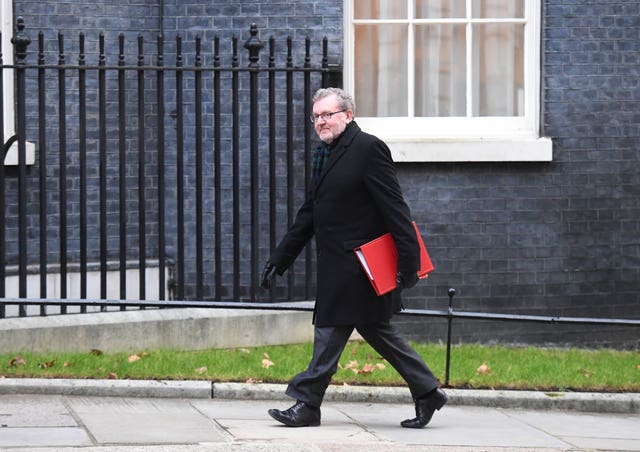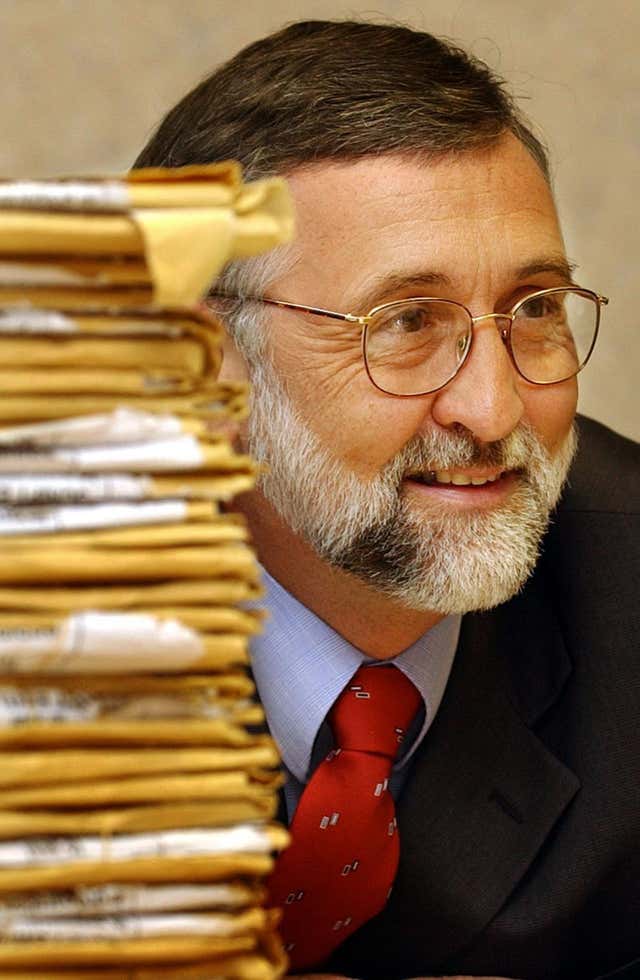
Holyrood still has “great potential” after two decades of devolution – but it has been unfulfilled in recent years under the SNP, the Scottish Secretary has said.
David Mundell was one of the original crop of MSPs elected to serve in the new Parliament in May 1999, though he has since gone on to politics at Westminster.
He recalled there were “very high hopes for the Parliament” as he reflected on when he was first elected as a list MSP for the South of Scotland.
 David Mundell moved on to Westminster, where he is now Scottish Secretary (Stefan Rousseau/PA)
David Mundell moved on to Westminster, where he is now Scottish Secretary (Stefan Rousseau/PA)
He said: “Not all of those have been realised but I think that’s not because of the Scottish Parliament, it’s because of the different Governments that have been part of it.
“I think the Parliament itself, I’m still very positive about – its role and what it can do.
“But the Government it creates and holds to account need to do better.
“The potential remains great but that has to be fulfilled and certainly in recent years, I don’t think that’s been the case.”
 David Mundell asked Peter Peacock the first question in the Scottish Parliament (David Cheskin/PA)
David Mundell asked Peter Peacock the first question in the Scottish Parliament (David Cheskin/PA)
As an MSP, Mr Mundell was the first person to ask a question at the newly established parliament on June 1 1999.
It was posed to then-education minister, Peter Peacock, about rural schools.
“That shows the issues don’t change,” Mr Mundell said.
He said there is not enough of a distinction made between Holyrood as an institution and the elected Government.
“I think we do need to do more to differentiate in the public mind the Scottish Parliament from the Scottish Government – I think most people are quite clear the House of Commons is not the Government, it’s different,” he explained.
“We have to work still to differentiate the parliament itself and all the things that it could do from the Scottish Government and what it does do.”
READ MORE: European election results can help Nicola Sturgeon in push for Scottish independence
So as someone who has served in both Holyrood and Westminster, how do the two compare?
“Twenty years ago, I think the Scottish Parliament was ahead of Westminster in terms of its approach,” Mr Mundell said.
“Now I think Westminster at the very least has caught up, if not made some changes the Scottish Parliament might like to consider.”
One difference frequently highlighted between the Parliaments in London and Edinburgh is the different systems of voting.
In Holyrood, MSPs are able to cast their votes electronically, while MPs at Westminster must still walk down one of two corridors.
Mr Mundell admits Westminster could perhaps adapt to some more fixed points for voting – similar to how Holyrood holds votes at decision time at 5pm.
“When I’m voting at 11 o’clock at night, I do look back fondly to voting at 5 o’clock with my card in the Scottish Parliament,” he says.
“The positive thing is, and this is true about the voting lobbies, is that it is an opportunity to interact with colleagues, with ministers, who you’re not bumping into these people all the time. So it does allow that.
“But when we’re voting for the 20th time at 11 o’clock, I do think, maybe there’s something to be said for electronic voting.”
 Ruth Davidson (right)">Mr Mundell’s son, Oliver, is an MSP for Dumfriesshire (Andrew Milligan/PA)
Ruth Davidson (right)">Mr Mundell’s son, Oliver, is an MSP for Dumfriesshire (Andrew Milligan/PA)
Although he no longer takes a seat in the Scottish Parliament, the Scottish secretary does still have a personal connection to Holyrood – his son, Oliver Mundell, an MSP for Dumfriesshire since being elected in 2016.
They are the only father and son to have served at the Scottish Parliament since it opened.
“I’m very, very proud of Oliver,” says Mr Mundell.
“Firstly, he did something that I didn’t do, which was he won the Dumfries constituency. I’d stood in the Dumfries constituency as a list MSP.
“My advice to him is very important and this applies in Westminster as well – Not to get caught up into the bubble.
READ MORE: Interview: Scotland Secretary David Mundell on independence, Brexit and David Cameron
“Your first duty is to your constituents and ultimately your constituents determine whether you’re there or not.
“And it is easy to get caught up in everything that is going on in Holyrood or at Westminster and just lose touch with what people are saying in Moffat High Street.
“That’s my advice to anyone who’s in politics – you’ve got to stay in touch with the people who elect you and not just get drawn into the bubble or into the latest intrigue in Holyrood in what people are saying in the bar or the canteen or whatever.
“I think that advice is as relevant to both Holyrood and to Westminster.”



Why are you making commenting on The Herald only available to subscribers?
It should have been a safe space for informed debate, somewhere for readers to discuss issues around the biggest stories of the day, but all too often the below the line comments on most websites have become bogged down by off-topic discussions and abuse.
heraldscotland.com is tackling this problem by allowing only subscribers to comment.
We are doing this to improve the experience for our loyal readers and we believe it will reduce the ability of trolls and troublemakers, who occasionally find their way onto our site, to abuse our journalists and readers. We also hope it will help the comments section fulfil its promise as a part of Scotland's conversation with itself.
We are lucky at The Herald. We are read by an informed, educated readership who can add their knowledge and insights to our stories.
That is invaluable.
We are making the subscriber-only change to support our valued readers, who tell us they don't want the site cluttered up with irrelevant comments, untruths and abuse.
In the past, the journalist’s job was to collect and distribute information to the audience. Technology means that readers can shape a discussion. We look forward to hearing from you on heraldscotland.com
Comments & Moderation
Readers’ comments: You are personally liable for the content of any comments you upload to this website, so please act responsibly. We do not pre-moderate or monitor readers’ comments appearing on our websites, but we do post-moderate in response to complaints we receive or otherwise when a potential problem comes to our attention. You can make a complaint by using the ‘report this post’ link . We may then apply our discretion under the user terms to amend or delete comments.
Post moderation is undertaken full-time 9am-6pm on weekdays, and on a part-time basis outwith those hours.
Read the rules hereLast Updated:
Report this comment Cancel